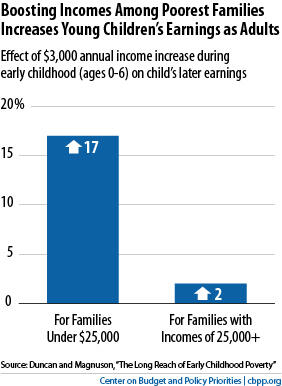BEYOND THE NUMBERS
Even as federal and state policymakers consider cutting back programs that boost the incomes of working-poor families, two researchers report evidence that poverty among young children not only slows them in school but also shrinks their earnings as adults.
This suggests that while cutting programs like Earned Income Tax credits (EITCs) and Temporary Assistance for Needy Families (TANF) may produce short-term budget savings, it also could generate significant costs for the nation down the road.
The new article, by Greg J. Duncan and Katherine Magnuson, is particularly notable because Duncan is one of the most respected researchers on the consequences of childhood poverty and is known for being particularly cautious in drawing policy conclusions from academic research. Two key points from the article stand out:
- Income matters for young, low-income children’s learning. Consistent findings from welfare-to-work programs and other anti-poverty experiments “suggest that income plays a causal role in boosting younger children’s achievement” in preschool and elementary school. Contrary to claims by some policymakers that children’s well-being depends more on how much their parents work than how much they earn, Duncan and Magnuson report that boosting the incomes of the poorest families had a significant impact on children’s educational performance whether or not these programs increased the number of hours that the parents worked.
- Poverty in early childhood may reduce earnings much later in life. For families with incomes below $25,000, children whose family received a $3,000 annual boost to family income when the children were under age 6 earned 17 percent more as adults, and worked 135 more hours per year after age 25, than otherwise-similar children whose families didn’t receive the income boost. The same effect was not found among families making over $25,000, for whom a $3,000 boost in income increased young children’s later earnings by only 2 percent (see graph).Image

“[G]reater policy attention should be given to remediating situations involving deep and persistent poverty occurring early in childhood,” Duncan and Magnuson conclude. They specifically recommend that federal and state policymakers:
- Expand tax credits for working families, especially those with young children. Duncan and Magnuson suggest increasing EITC and child tax credit benefits for families with young children. While the article doesn’t examine state EITCs, these credits are similar in design to the federal EITC, which has been found to improve early childhood achievement.
- Avoid TANF changes that threaten the well-being of young children. TANF programs are often a critical source of income for the most vulnerable families with young children. Yet to help close their budget shortfalls, several states have proposed or initiated cuts to their TANF programs, such as cutting off benefits for the entire family if a parent fails to meet one of the program’s requirements.
Duncan and Magnuson urge policymakers to ensure that such sanctions and other TANF regulations do not deny benefits to families with very young children: “Not only do young children appear to be most vulnerable to the consequences of deep poverty, but mothers with very young children are also least able to support themselves through employment in the labor market.” This research suggests that other potential policy changes within TANF, such as establishing harsher time limits or significantly reducing benefits, could also harm young children.
In short, reducing help to low-income working families to save money now would be penny-wise but pound-foolish.
